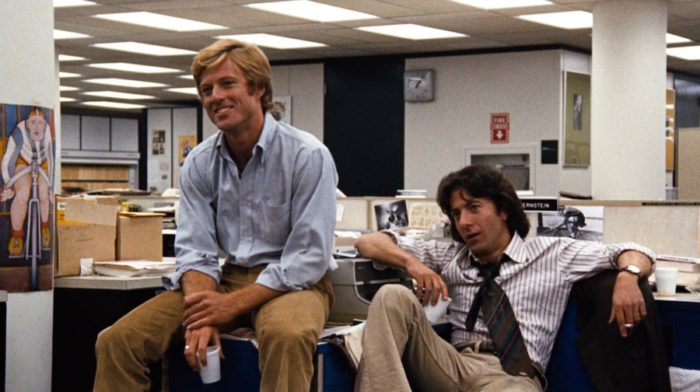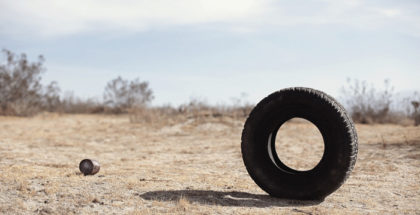VOD film review: All the President’s Men
Review Overview
Cast
10Direction
10Truth
10David Farnor | On 09, Aug 2018
Director: Alan J. Pakula
Cast: Dustin Hoffman, Robert Redford
Certificate: 15
Watch All the President’s Men: Apple TV (iTunes) / Prime Video (Buy/Rent) / Google Play
Woodward and Bernstein. Two names as well-known as the words Watergate and Nixon. The reason is, of course, the towering scandal that toppled the 37th President of the United States, bringing the respected office of the White House into disrepute – and the two journalists who did the toppling. But 46 years on, their role remains iconic, inspirational and important thanks to another piece of equally vital work: All the President’s Men.
Alan J. Pakula’s account of how Bob Woodward (Robert Redford) and Carl Bernstein (Dustin Hoffman) uncovered the scandal in its entirety is a remarkable piece of cinema, and it’s all the more so because of how unremarkably it presents everything. This is a dialogue-heavy story, stuffed with riddles and far from straightforward; a twisting labyrinth of cover-ups, lies, secrets and non-denial denials, where words are designed to obfuscate reality and people are paid to make those words even harder to decipher.
Another filmmaker might attempt to jazz up that impenetrable treacle of confusion, or edit down the details into something short and snappy. Not Pakula, who crafts a procedural thriller that revels in the long, slow process of truth – it takes William Goldman, who wrote the playfully self-aware The Princess Pride, to be audacious enough to pen a script that’s as lengthy as the paperwork Bob and Carl had to wade through, sticking to reality with a tenacity that ought to be dull, but winds up all the more riveting.
By forcing themselves, and forcing us, to keep track of the trail that leads from the break-in at the Democratic National Committee in 1972 all the way to the Oval Office, All the President’s Men fosters a first-hand respect for the arduous slog of proper journalism – a reminder, particularly in an age of clickbait headlines and fake news (spread by powers domestic as well as foreign), that the battle for facts isn’t easy, and shouldn’t be undervalued. Dustin Hoffman and Robert Redford are impeccable as the noble duo, precisely because, like their director, they underplay everything to the point of mundanity; such is the quest for authenticity here that even the security guard who stumbled upon the robbery (Frank Wills) is played by himself.
The result is intelligent, thoughtful and endlessly fascinating, as we see the shocking scale of the Watergate mess expand across the Capitol, one telephone number at a time, each (non-)statement having to be double-checked and verified by another anonymous witness. It’s an epic struggle that shreds the nerves of the reporters – editor Ben Bradlee (Jason Robards) forces them together, so that the veteran Carl can guide the younger Bob – and fosters a growing air of paranoia that becomes oppressive in its believability.
Robards’ Bradlee is a particular treasure, as he cuts through that paranoia with wry, often accurate humour. “For all the ‘We love America’ sentiment many Americans have, it seems not many of them actually know or care about what is happening in the country,” he quips at one point.
The film’s convincing air can’t be appreciated enough: in the decades since the movie’s premiere, the number of accurate representations of how the media works can be counted on one hand (say hello to Good Night, and Good Luck, Spotlight and The Post). And at a time when the free press is portrayed by some leaders as the enemy of the people, All the President’s Men is a resounding tribute to the legwork that went into real reporting in the days before the Internet. Years on and their informant Deep Throat’s advice to “follow the money” only feels more prescient than ever – and it’s that knack for distilling the complexities of a dizzyingly large conspiracy that makes All the President’s Men not just an impressive accomplishment but an essential document. Like all the best reporting, it’s accessible yet comprehensive, entertaining but informative, unbiased but challenging. It’s a mission statement for all journalists starting out in their careers, and a wishlist for all civilisations where those careers are being sidelined and forgotten.
“Nothing’s riding on this except the First Amendment of the Constitution, freedom of the press, and maybe the future of the country,” jokes Bradlee, sternly. “Not that any of that matters.”
Depressingly, brilliantly, the more time passes, the more relevant it gets. Bylines don’t get more historic than that.




















